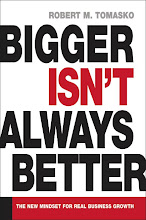March 31, 2006
Seminar link
Here’s a link to my March 8th seminar on Bigger Isn’t Always Better. The words and the music are available in this Microsoft Live Meeting Archive. If you have trouble accessing any of this, contact me and I’ll send you a pdf of the slides.
Link
Link
March 07, 2006
AT&T and BellSouth: Is bigger going to be better?
Ken Belson’s interesting article in today’s New York Times asks a good question:
He’s analyzing the just announced AT&T (which used to be SBC which used to be Southwestern Bell which used to be AT&T) offer to buy BellSouth. Belson looks hard at how questionable the payoff from this deal really is. His headline suggests AT&T’s goal is to become all things to all customers. Sounds familiar.
Link
"Is bigger necessarily better when it comes to running a telecommunications company?"
He’s analyzing the just announced AT&T (which used to be SBC which used to be Southwestern Bell which used to be AT&T) offer to buy BellSouth. Belson looks hard at how questionable the payoff from this deal really is. His headline suggests AT&T’s goal is to become all things to all customers. Sounds familiar.
Link
March 01, 2006
Upcoming seminar on Bigger Isn’t Always Better
Next Wednesday Microsoft will host, and the American Management Association (my publisher) will sponsor, a web-based seminar on the ideas in the front end of my book.
I’ll present for about 45 minutes with the remaining time for Q&A.
For more information, and to register, click on the link below.
There's no cost to you. All you need is a phone and a computer.
When you register, you’ll be sent a url to paste into your browser (do this about 11:55 am), and a phone number to hear me talk to the slides that will appear on your computer screen. You type in questions, IM-style. Works with Macs and PCs. All this uses Microsoft Office Live Meeting technology. And it’s totally free; the organizers even provide you with a (US) toll-free number.
Come join in!
Note: If you can't make the live session, you haven't completely missed-out. Microsoft archives all these. Slides and sound will be available to review whenever you wish.
Link
Wednesday March 8th
Noon to 1 pm (EST)
Noon to 1 pm (EST)
I’ll present for about 45 minutes with the remaining time for Q&A.
For more information, and to register, click on the link below.
There's no cost to you. All you need is a phone and a computer.
When you register, you’ll be sent a url to paste into your browser (do this about 11:55 am), and a phone number to hear me talk to the slides that will appear on your computer screen. You type in questions, IM-style. Works with Macs and PCs. All this uses Microsoft Office Live Meeting technology. And it’s totally free; the organizers even provide you with a (US) toll-free number.
Come join in!
Note: If you can't make the live session, you haven't completely missed-out. Microsoft archives all these. Slides and sound will be available to review whenever you wish.
Link
Hardball in the hardware aisle
Home Depot, says USC business professor Ed Lawler, “grew so fast the wheels were starting to come off.” Customers who once loved its great selection and incredibly helpful sales staff have been fleeing in droves for competitors such as Lowe’s. Some Home Depot managers feel their service ethic has been corroded by an atmosphere of fear that has accompanied the “hardball” approach to management associated with CEO-since-2000, Robert Nardelli.
Business Week’s March 6 issue includes a cover story praising Home Depot’s new military-style of management. It quotes one Home Depot store manager, an ex-Army squad commander who once hunted terrorists, as saying:
I don’t know if I want to be one of the customers caught in his cross hairs. And it’s not just me. A customer satisfaction index released last week by the University of Michigan showed Home Depot in last place among major American retailers.
Hardball is an aggressive approach to management popularized by management consultant George Stalk. It’s a tempting fallback for a growth challenged business: do what you’ve been doing before, just harder. Play rough (with customers, suppliers, competitors, regulators) and never apologize. I took a hard look at it when I wrote Bigger Isn’t Always Better, and found research shows the harder a business strives to grow along these lines, the more likely it is to undermine its chances of achieving real growth. Hardball invariably melts into softball.
Business Week thinks Home Depot is thriving. I’m not so sure.
Link
Business Week’s March 6 issue includes a cover story praising Home Depot’s new military-style of management. It quotes one Home Depot store manager, an ex-Army squad commander who once hunted terrorists, as saying:
“In the military we win battles and conquer the enemy. At Home Depot, we do that with customers.”
I don’t know if I want to be one of the customers caught in his cross hairs. And it’s not just me. A customer satisfaction index released last week by the University of Michigan showed Home Depot in last place among major American retailers.
Hardball is an aggressive approach to management popularized by management consultant George Stalk. It’s a tempting fallback for a growth challenged business: do what you’ve been doing before, just harder. Play rough (with customers, suppliers, competitors, regulators) and never apologize. I took a hard look at it when I wrote Bigger Isn’t Always Better, and found research shows the harder a business strives to grow along these lines, the more likely it is to undermine its chances of achieving real growth. Hardball invariably melts into softball.
Business Week thinks Home Depot is thriving. I’m not so sure.
Link
